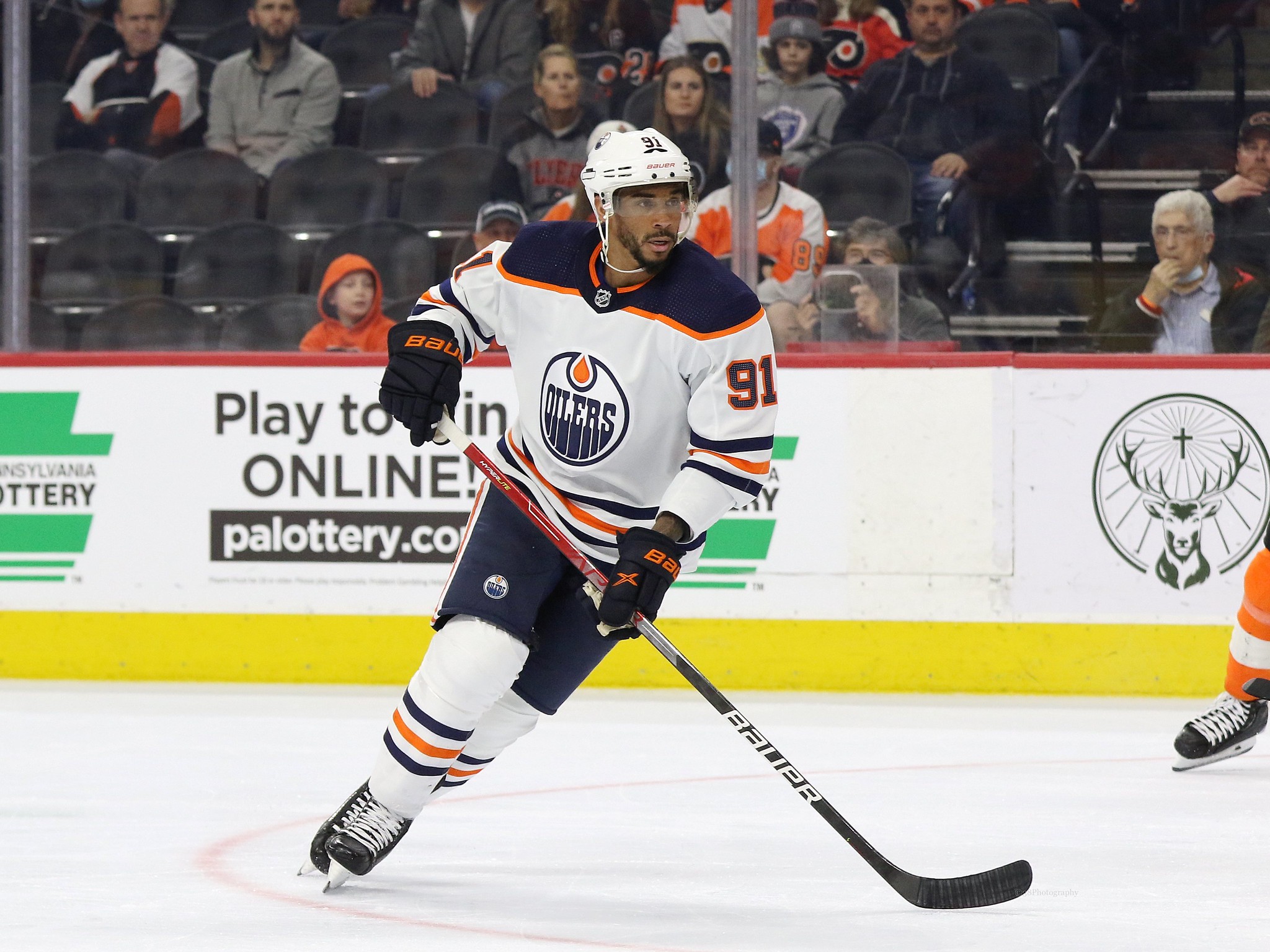While Evander Kane is doing his best to help the Edmonton Oilers stay alive in this year’s Stanley Cup Playoffs, there’s some business that will need to be discussed between the Oilers and Kane’s representatives as soon as this series — or the Final if Edmonton advances — is complete. One of the stories in the background of any negotiation between the two sides is where Kane sits with the San Jose Sharks.
On the surface, the forward and the Sharks organization appear to have moved on from one another. That’s not really the case, because Kane and the NHLPA have filed a grievance over the termination of his previous contract. One hearing has already taken place and another will follow as soon as the Oilers’ playoff run is complete. If he wins that grievance, the Sharks will be on the hook for a good chunk of Kane’s remaining salary.
The Details Of What Could Happen
As per Sheng Peng of NBC Sports, “At stake is the entirety of Kane’s contract, both money owed and the cap hit. In short, it’s all or nothing for both the Sharks and Kane.” He adds, “If the Sharks win and the termination is upheld, they’re free and clear of all obligations to Kane. If Kane wins and the termination is overturned, the Sharks owe him the balance of his contract.”

This gets interesting because Kane can’t double dip between the Oilers and the Sharks. If Edmonton signs Kane to an extension, say around $4 million per season, the Sharks (should they lose the grievance) have to pay off the difference. If Kane wins, the Sharks could owe him as much as $19 million of actual cash over the next three seasons. That’s $7 million AAV against the cap and that’s enough to wonder if the Sharks would simply rather just have the player at that price.
Related: Oilers Looking to Turn Playoff Fortunes Around at Home
The same source that said the Sharks would owe the difference of what Kane makes on an extension with the Oilers and what they are ruled to pay if they lose said, “If Kane wins his grievance, his rights and contract would revert entirely back to the Sharks.”
Then What Happens With Kane?
If Kane wins his grievance and the Sharks decide to keep the player, they’ll have a few choices. First, they could try to trade Kane. That would allow them to recoup something for the asset and get his salary off of their books. He has a three-team trade clause which, one would assume, would include the Oilers.
You may also like:
- NHL Rumors: Oilers Not Done, Maple Leafs Changes, Matthews and Tkachuk
- Are the Maple Leafs and Oilers Working on a Nicolas Roy Trade?
- Connor Murphy: Everything to Know About Oilers’ Newest Acquisition
- Oilers Must Convince Maple Leafs’ Ekman-Larsson To Waive NTC
- NHL Trade Grades: Oilers Boost Defense With Connor Murphy Addition
Second, the Sharks might buy him out if they can’t trade the player and still don’t want him on their roster. The buyout would lessen the cap hit over the course of six seasons, versus three more at $7 million. Kane could then become an unrestricted free agent and double dip, getting his buyout and the new deal from whatever team he signs with.
Third, the two sides (Kane and the Sharks) could live happily ever after together. That seems unlikely.
How Might the Oilers Play a Role?
The Oilers will have some say in how this all shakes down, but it’s not clear at what stage they could interfere with the grievance, if at all. For example, if the Oilers and Kane come to an agreement on an extension before Kane either wins or loses his grievance, does that new deal stay intact if San Jose loses and chooses to keep the player? In other words, could the Oilers and GM Ken Holland sign Kane to a $5 million extension first, then hope San Jose sees that it will only cost them $2 million (at most) to let him go?

Alternatively, could the Oilers let the Sharks win or lose their case and then work out a deal with Kane, talking to the Sharks in the background? Doing so has some advantages. First, the Oilers could sign Kane for an amount they are comfortable with and the Sharks are comfortable paying the difference on. If the Oilers give Kane $5 million and San Jose says, ‘cool, we’ll pay the $2 million’, both sides can move on.
Second, the Oilers can take the chance they’ll be the favorites in any trade the Sharks feel they have to make. Edmonton would have some leverage in a deal since Kane can only be moved to one of three teams and if they make a trade, the Oilers get Kane at three more years, without having to commit long-term.
Finally, the Oilers might prefer a trade because they could move some salary back the other way and perhaps convince the Sharks to retain $2 million or more of Kane’s salary, getting Kane at the same dollar figure but for less time. In the process, Holland clears out a little cap space.
It’s an interesting situation. The Sharks clearly want the Oilers to re-sign Kane for as much money as possible, simply so they don’t have to pay much if they lose their grievance. But, the Oilers might be ok with the Sharks losing and taking the player back, if they know he’ll ultimately wind up in Edmonton anyway because the two teams can work out a deal.
